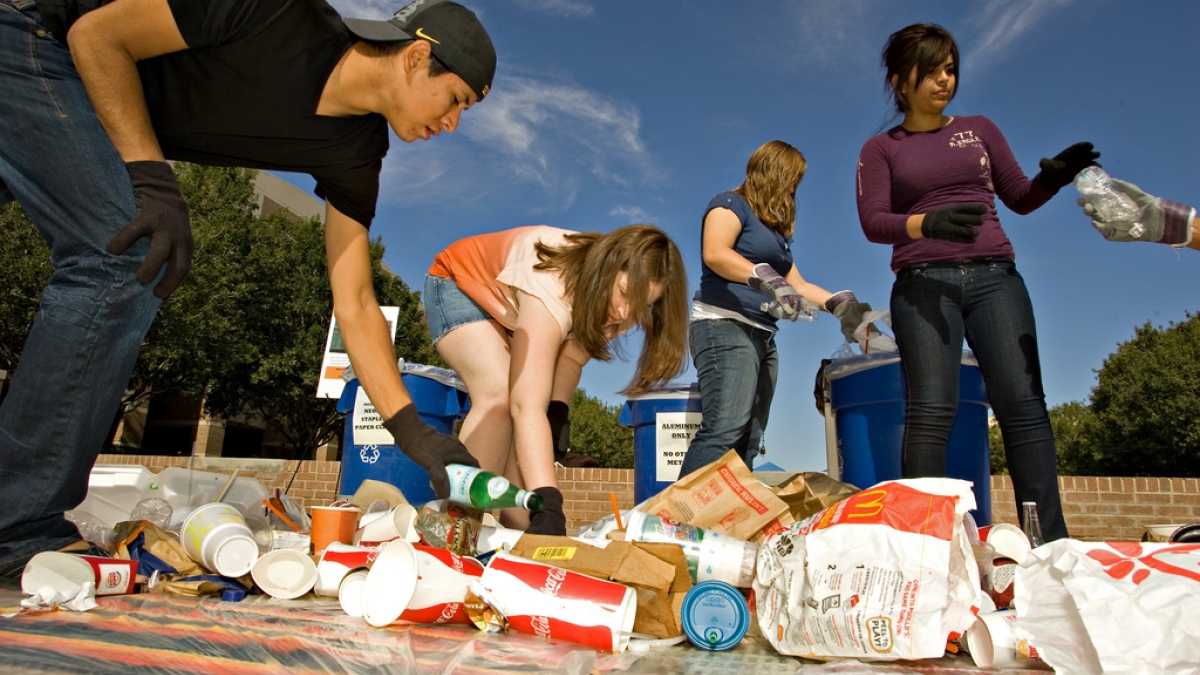ASU kicks off Earth Month with launch of Zero Waste initiative

To minimize the amount of waste heading to the landfill, Arizona State University has launched the university-wide Zero Waste at ASU initiative on April 1 to kick off Earth Month 2014. The initiative hopes to help ASU achieve zero solid waste status by 2015.
The zero waste principle aims for the diversion and aversion of more than 90 percent of trash away from the landfill. Diversion techniques include blue bin recycling, green bin composting and reusing or repurposing; and aversion tactics include reducing or avoiding the use of non-recyclable and non-compostable materials altogether.
According to the United States Environmental Protection Agency, an average American generates 4.38 pounds of trash every day, of which 1.51 pounds is recyclable and compostable. In 2012, Americans generated nearly 251 million tons of trash, and only 34 percent was diverted away from the landfill.
"As a New American University, ASU is committed to catalyzing social change and enabling students to succeed by being at the cutting edge of a healthy, sustainable learning environment," said ASU President Michael M. Crow. "By aiming to become a zero-waste university, ASU is not only making progress toward its goal of cutting greenhouse gas emissions and becoming climate neutral, but also instilling sustainability as a value in our students, staff and faculty, who form the critical mass to significantly impact the institution, as well as their communities."
“ASU is known for incorporating sustainability into research, education, practice and outreach,” said John Riley, ASU’s sustainability operations officer. “Our efforts to achieve zero waste status bolster our position as a living laboratory where we practice what we preach.”
To increase the amount of waste diverted away from the landfill, the blue bin recycling program, currently available university-wide, will be expanded.
Green bin composting will be available at select locations on the Tempe campus, such as Barrett, Hassyampa, Palo Verde and Manzanita dining halls as part of a pilot program. It will then be rolled out systematically across the university over time and more information will be provided as specific initiatives become available.
Individuals will be able to place recyclables such as hard plastics, glass and aluminum cans into the blue bins available university-wide, and discard organic waste such as food, liquid, paper towels and napkins in the green bins available at aforementioned locations.
"ASU has been testing the zero-waste principle at several of its events with support from partners and vendors," said Nick Brown, director of University Sustainability Practices. "One of our most successful zero-waste events was the March 2014 meeting of the Clinton Global Initiative University. The first day of the event saw 99.1 percent of trash diverted away from the landfill, while the final day witnessed a 94.6 percent diversion rate."
In addition, since the spring of 2013, Sun Devil Athletics has hosted zero-waste athletics events for men's basketball, women's basketball, gymnastics, volleyball, soccer, softball and baseball. In fall of 2013, ASU hosted its first zero-waste football games with the Territorial Cup match-up against Arizona and the Pac-12 Championship game against Stanford.
"The Zero Waste at ASU initiative challenges the status quo; it requires participants to forget everything they know about trash and learn the new way of doing things," said Corey Hawkey, Zero Waste at ASU program manager.
“Everyone has a responsibility; the first step is rethinking everyday activities and using recycling bins,” said Alana Levine, manager of ASU Recycling. “Even if you start small, you are contributing.”
More information regarding the Zero Waste at ASU initiative is available at zerowaste.asu.edu. Ask your questions regarding zero waste by tweeting @ZeroWasteASU.